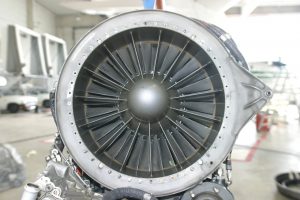Waspaloy

Nickel Waspaloy (Alloy 685)
Waspaloy (also known as Alloy 685) is a nickel base, age hardenable superalloy with excellent high-temperature strength and good corrosion resistance by combustion products, notably to oxidation, at service temperatures of up to 1200°F (650°C) for critical rotating applications, and up to 1600°F (870°C) for less demanding applications. At temperatures over 1600°F (870°C), intergranular oxidation can occur.
The corrosion resistance is very good even after numerous cycles of elevated temperature exposure, or constant exposure to temperatures of up to 1900°F (1038°C). For the best possible corrosion resistance, solution-treated material is recommended. Waspaloy is also known to behave well in atmospheres in gas turbine engine service and salt spray environments.
Due to these properties, Nickel Waspaloy finds use in gas turbine engine components and aircraft jet engines, such as compressor disks, rotor disks, shafts, spacers, seals, rings, and casings. It also finds use in fasteners and other engine hardware in airframe assemblies and missile systems. Waspaloy is produced by vacuum induction melting and vacuum arc refining (VIM/VAR), or by vacuum induction melting and electroslag refining (VIM/ESR).
Tech Steel & Materials offers Nickel Waspaloy in 8 sub-type specifications and in multiple shapes/forms:
- AMS 5544 (Plate, Sheet, and Strip)
- AMS 5586 (Tubing)
- AMS 5704 (Forging)
- AMS 5706 (Bar, Forging, and Ring)
- AMS 5707 (Bar, Forging, and Ring)
- AMS 5708 (Bar, Forging, and Ring)
- AMS 5709 (Bar and Forging)
- AMS 5828 (Wire)
Chemical Composition of Nickel Waspaloy
| Element | min | max |
| Carbon | 0.02 | 0.10 |
| Manganese | — | 0.10 |
| Silicon | — | 0.15 |
| Phosphorus | — | 0.015 |
| Sulfur | — | 0.015 |
| Chromium | 18.00 | 21.00 |
| Cobalt | 12.00 | 15.00 |
| Molybdenum | 3.50 | 5.00 |
| Titanium | 2.75 | 3.25 |
| Aluminum | 1.20 | 1.60 |
| Zirconium | 0.02 | 0.08 |
| Boron | 0.003 | 0.010 |
| Iron | — | 2.00 |
| Copper | — | 0.10 |
| Lead | — | 0.0005 (5 ppm) |
| Bismuth | — | 0.00003 (0.3 ppm) |
| Selenium | — | 0.0003 (3 ppm) |
| Silver | — | 0.0005 (5 ppm) |
| Nickel* | remainder | |
*Not exclusively to the element mentioned, but that one predominates other elements that are used only in minimal quantities.
Fabrication and Working Instructions for Waspaloy
Waspaloy can be hot-worked in the temperature range of 2140-1800°F (1170-980°C), and cold-worked by hydroforming, drawing, spinning, bending, and rolling. That said, this nickel base alloy is difficult to machine and special instructions must be followed.
As for joining, Waspaloy can be readily-welded only in carefully controlled circumstances with argon-arc methods using the AMS 5828 composition filler metal. That said, welds should be avoided in high-stress locations, due to the fact that the high strength of the welds is lower than a heat-treated material. More precisely, Waspaloy may show “hot short” tendency and sensitivity to strain cracking. That’s why, it is highly recommended that welding is done on a material that is only solution treated, and then re-solution treated together with the weld.
Physical Constants of Waspaloy (Alloy 685)
| Density | 0.296 lb/in3 |
| 8.19 g/cm3 | |
| Melting Range | 2425-2475°F (1330-1360°C) |
| Coefficient of Thermal Expansion | at 70-200°F (21-93°C) – 6.8 x 10-6 in/in/°F |
| at 70-1000°F (21-583°C) – 7.7 x 10-6 in/in/°F | |
| at 70-2000°F (21-1093°C) – 10.4 x 10-6 in/in/°F | |
| Electrical Resistivity | Solution treated at 1975°F (1080°C) and cooled for 4 hours – 1.24 microhm•m (0.38 microhm•ft) |
| Fully age hardened at 1550°F (845°C), and cooled for 24 hours + reheat to 760°C (1400°F), and cooled for 16 hours – 1.20 microhm•m (0.37 microhm•ft) | |
| Modulus of Elasticity (Dynamic) | at 70°F (21°C) – 30.3 x 103 ksi (211 GPa) |
| at 1000°F (538°C) – 26.7 x 103 ksi (184 GPa) | |
| at 1600°F (871°C) – 22.7 x 103 ksi (157 GPa) | |
| Magnetic Permeability (200 oersteds) | Solution treated + aged – 1.004 |
Minimum Tensile Properties (Room Temp)
| Property | Value |
| Tensile Strength | 175 ksi |
| Yield Strength at 0.2% Offset | 120 ksi |
| Elongation in 4D | 15% |
| Reduction of Area | 18% |
Heat Treating Nickel Waspaloy
Nickel Waspaloy is heat treated in a three-step sequence. There are two different treatments available, both giving different properties to the alloy:
For parts that require high-temperature creep and stress-rupture properties:
- Solution treatment – heat at 1975°F (1080°C), and air cool for 4 hours to produce hardness of 20-25 Rockwell C;
- Stabilization – reheat to 1550°F (845°C), and air cool for 24 hours;
- Age harden – reheat to 1400°F (760°C), and air cool for 16 hours to achieve a hardness of 34-40 Rockwell C;
For parts that require optimum tensile properties at room temperature and high-temperature environments:
- Solution treatment – heat at 1825-1895°F (995-1035°C), and then oil quench for 4 hours;
- Stabilization – reheat to 1550°F (845°C), and air cool for 4 hours;
- Age harden – reheat to 1400°F (760°C), and air cool for 16 hours to produce hardness of 33-44 Rockwell C;
Scale may be formed on the alloy during heat treatment in oxidizing atmospheres. However, this doesn’t affect the properties of the alloy and can be removed by acid pickling or mechanically.


 Tech Steel & Materials
Tech Steel & Materials